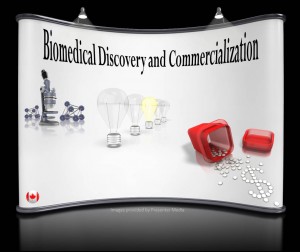 Canada is known for its hockey, maple syrup, the beaver, Canadian goose and apologetic nature (sorry). But our list of accomplishments doesn’t end there. Canadians are also tenacious innovators in the fields of biomedical science and biotechnology. Trailblazing Nobel Prize winners like Michael Smith (Site Directed Mutagenesis) and Sir Banting and Best (insulin) paved the way for our current luminaries like Tak Mak (T-cell receptor), Eric Brown and Gerry Wright (antibiotic discovery). These avant-gardists have two characteristics in common: creativity and acumen.
Canada is known for its hockey, maple syrup, the beaver, Canadian goose and apologetic nature (sorry). But our list of accomplishments doesn’t end there. Canadians are also tenacious innovators in the fields of biomedical science and biotechnology. Trailblazing Nobel Prize winners like Michael Smith (Site Directed Mutagenesis) and Sir Banting and Best (insulin) paved the way for our current luminaries like Tak Mak (T-cell receptor), Eric Brown and Gerry Wright (antibiotic discovery). These avant-gardists have two characteristics in common: creativity and acumen.
In today’s “entrepreneurial university” setting, how do we go about teaching our future graduates these characteristics? How do we bottle biomedical discovery and commercialize it? Curriculum design dictates the establishment of a planned, rigid structure of a program intent on teaching (at) students the wonderful accomplishments of our innovators. This would be wrapped up in a nice, neat package presented at students in the comfort of a classroom. The end product would be a graduate full of fancy knowledge with no creativity, tenacity or grit.
And so we threw out the curriculum design process and set out to create our own (un)curriculum. This was a real, in-your-face, intensive one day think-tank bringing together our stakeholders: the Triple Helix (government, academia, industry) and students. We asked them two questions: What skills do you need to succeed? How can we make it happen?
The outcome was humbling. Our stakeholders exploded with opinions and ideas. The think-tank was abuzz with dialogue and reflection. Amidst the seemingly chaotic milieu, a schema emerged. Dubbed the (un)curriculum, this plan became the backbone of our new Biomedical Discovery and Commercialization (BDC) program.
Pioneering pedagogical learning styles lie at the heart of this (un)curriculum. Our stakeholders identified key skills that make up the ideal graduate students. Among the usual suspects of laboratory and business experience lie surprising gems like learning-to-learn, persistence, grit, optimism, creativity and tacit knowledge transfer. These non-cognitive factors have become the platform on which our courses are built.
Our BDC program is a combined undergraduate Bachelor of Health Sciences program that begins in level III, followed by a fifth year in which candidates complete a non-thesis course-based Master’s degree in Biomedical Discovery and Commercialization. Focus is placed on the “entrepreneurial graduate” by immersing students in biomedical enterprise: from bench to bedside and beyond. The BDC program acts as a hub for collaborative dialogues between the Faculties of Science, Health Science, DeGroote School of Business, industry and community stakeholders. The aim of the BDC program is to produce research-focused graduates with the combined strength of discovery research skills and business acumen.
To celebrate our BDC students’ achievements we will utilize a virtual platform, BDC Dialogues, designed to engage community of practice exchange of ideas. BDC Dialogues is a virtual learning collaborative intended to actively engage undergraduate and graduate BDC students with their community mentors throughout their BDC journey. The community includes faculty members from various faculties (health science, science, business, and engineering), industry stakeholders, clinicians, etc. Tentatively, the BDC Dialogues website will feature: blog sites allowing for open reflection and discussion; learner-team project showcase; award/competition opportunities that will be sponsored by industry partners; general discussion board and feedback surveys. A yearly summit – BDC ENGAGE – will bring together BDC students with their mentors in a day-long event featuring multiple communication networks designed to celebrate and enhance engagement, while initiating new interfaces with the global community. Our long-term goal is to transcend the BDC community of practice into a global network intent on biomedical discovery and commercialization.
We are very proud of our BDC program. These are simple words, but they are honest and heartfelt. And so, we leave you with one parting thought. When you think of Canada, think of Biomedical Discovery and Commercialization … and Canadian bacon, eh?
Please feel free to contact us if you have any questions.
Please sign in or register for FREE
If you are a registered user on Research Communities by Springer Nature, please sign in